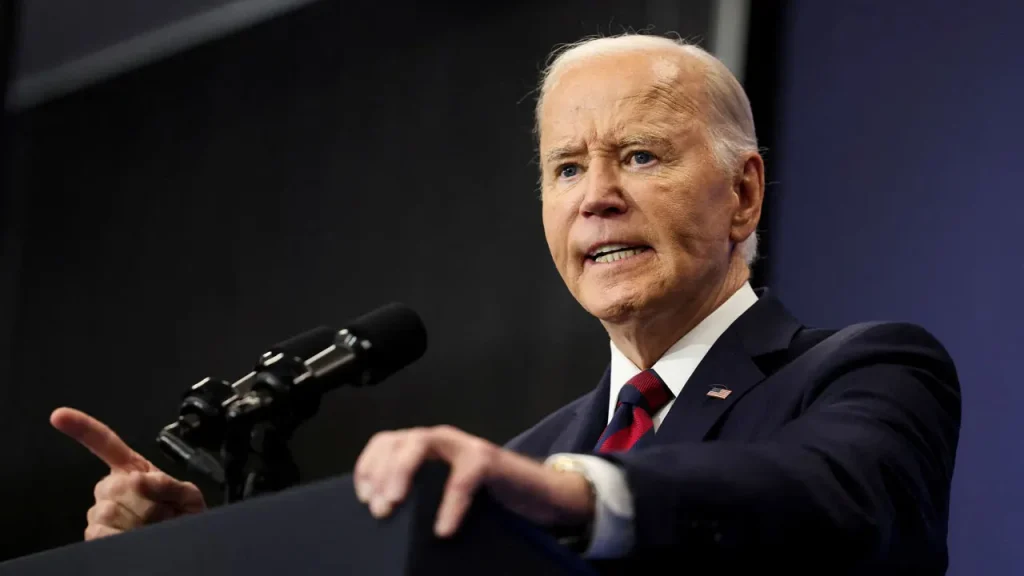President Joe Biden’s decision to commute the sentences of nearly all federal death row inmates ignited a firestorm of criticism from Republicans, who accused him of being “soft on crime.” This sweeping act of clemency, affecting 37 individuals convicted of capital crimes, transformed their sentences to life imprisonment without the possibility of parole. Leading the charge against Biden’s decision were prominent figures like Senator Tom Cotton of Arkansas, incoming chairman of both the Senate GOP conference and the Senate Select Committee on Intelligence. Cotton unleashed a scathing attack on the president, characterizing him as a “demented failure” whose administration had become a “memory care facility.” He attributed the commutations to the influence of Biden’s “corrupt kids and Marxist staffers.” House Majority Whip Tom Emmer of Minnesota echoed these sentiments, linking Biden’s decision to his perceived lax border policies and claiming it was the reason voters “fired him and reelected President Trump.” This narrative, despite being factually incorrect regarding the election outcome, underscores the deep partisan divide surrounding the issue.
The Republican backlash extended beyond these prominent figures. Senator Marsha Blackburn of Tennessee condemned the commutations on social media, arguing for an end to “soft-on-crime policies.” House Speaker Mike Johnson of Louisiana characterized the move as a “slap in the face” to the victims’ families, emphasizing the devastating impact of these crimes. This collective outcry from Republican lawmakers painted a picture of a president prioritizing criminals over victims and undermining the principles of justice. Their rhetoric highlighted a stark contrast between their tough-on-crime stance and what they perceived as Biden’s leniency towards individuals convicted of heinous offenses. The Republican response consistently framed the commutations as an affront to the rule of law and a dangerous precedent that would embolden criminals.
In contrast, Biden’s decision was met with applause from Democrats and progressive groups, who hailed it as a historic step towards justice and mercy. Senate Judiciary Chairman Dick Durbin of Illinois praised the president’s leadership, asserting that the commutations provided accountability while avoiding the complex issues associated with capital punishment. Durbin, a long-time advocate for abolishing the federal death penalty, viewed Biden’s action as a significant victory in the fight against this controversial practice. Similarly, Congressional Progressive Caucus Chairwoman Pramila Jayapal of Washington celebrated the commutations as a “powerful use of executive action to save lives and deliver justice.” She emphasized the discriminatory and inhumane nature of capital punishment, framing Biden’s decision as a necessary corrective to a flawed system. These voices within the Democratic party positioned Biden’s move as a courageous act of moral leadership.
The contrasting reactions underscore the deep-seated ideological divide on the issue of capital punishment and criminal justice reform. While Republicans framed the commutations as a betrayal of victims and a dangerous precedent, Democrats viewed them as a necessary step towards a more just and humane system. This clash of perspectives highlights the ongoing debate about the role of punishment versus rehabilitation in the criminal justice system. Furthermore, the timing of Biden’s decision, occurring after he had already commuted sentences for roughly 1,500 individuals, amplified the political implications. This broader context of clemency grants further fueled the Republican narrative of a president overly lenient towards criminals, while solidifying Biden’s image among supporters as a leader prioritizing compassion and reform.
The commutations also raise important questions about the future of the death penalty in the United States. Biden’s actions, while not abolishing capital punishment outright, signal a clear shift away from its use at the federal level. This move could potentially influence states to reconsider their own death penalty practices and contribute to the ongoing national conversation about its effectiveness and morality. The debate surrounding Biden’s decision highlights not only differing views on punishment but also broader philosophical questions about the role of the state in dispensing justice and the balance between retribution and rehabilitation. This complex interplay of legal, ethical, and political considerations underscores the enduring controversy surrounding capital punishment in America.
Furthermore, the highly charged political rhetoric surrounding Biden’s decision exemplifies the increasing polarization of American politics. The starkly different interpretations of the commutations, with Republicans decrying them as an act of weakness and Democrats lauding them as a display of compassion, illustrate the widening gulf between the two parties on issues of criminal justice. This deep partisan divide makes constructive dialogue and bipartisan solutions increasingly challenging, further entrenching opposing viewpoints and hindering progress on critical issues facing the nation. The intense reactions to Biden’s decision serve as a microcosm of the broader political landscape, where even issues of life and death are often refracted through a partisan lens.

